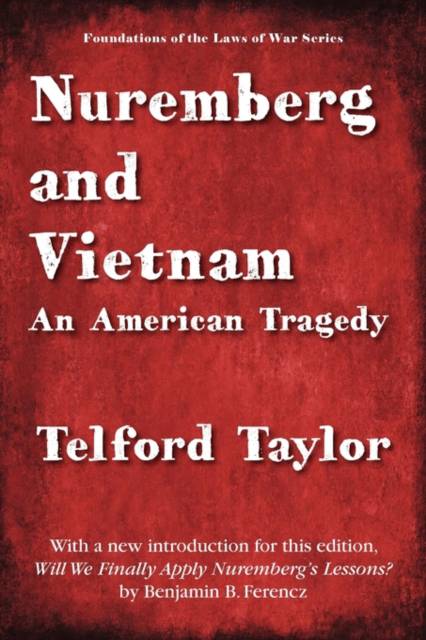
- Retrait gratuit dans votre magasin Club
- 7.000.000 titres dans notre catalogue
- Payer en toute sécurité
- Toujours un magasin près de chez vous
- Retrait gratuit dans votre magasin Club
- 7.000.0000 titres dans notre catalogue
- Payer en toute sécurité
- Toujours un magasin près de chez vous
39,45 €
+ 78 points
Format
Description
With a New Introduction by Benjamin Ferencz, Chief Prosecutor for the United States at the Nuremberg War Crimes Trial Originally published three years before the withdrawal of U.S. troops in 1973, this important book was not a polemic, but a sober account of the Vietnam conflict from the perspective of international law. Framed in reference to the Nuremberg Trials that followed the Second World War, it described problems the United States may have to face due to its involvement in the Vietnam conflict. After presenting a general history of war crimes and an account of the Nuremberg Trials, Taylor turns his attention to Vietnam. Among other points, he examined parallels between actions committed by American troops during the then-recent My Lai Massacre of 1968 and Hitler's SS in Nazi-occupied Europe. Commissioned for this edition, Ferencz's introduction evaluates Taylor's study and its lessons for the present and future. When this book was published in 1970, Telford Taylor had concluded that U.S. involvement in the war in Vietnam was an American tragedy: "Somehow we failed ourselves to learn the lessons we undertook to teach at Nuremberg." What were those lessons? How acceptable were they? Which laws of war could realistically be enforced on a raging battlefield against an implacable foe? Forty years later, it is worth re-examining how it came about that this powerful and humanitarian country could have come to be seen by many as a giant "prone to shatter what we try to save. -From the Introduction by Benjamin B. Ferencz Telford Taylor [1908-1998] was chief counsel for the prosecution at the Nuremberg Trials. Later Professor of Law at Columbia University, he was a vigorous opponent of Senator Joseph McCarthy and an outspoken critic of U.S. actions during the Vietnam War. His books include Sword and Swastika: Generals and Nazis in the Third Reich (1952), Grand Inquest: The Story of Congressional Investigations (1955) and The Anatomy of the Nuremberg Trials: A Personal Memoir (1992). Benjamin Ferencz, a member of Taylor's legal staff, was the Chief Prosecutor for the United States at the Nuremberg War Crimes Trial. He is the author of Defining International Aggression-The Search for World Peace (1975), Adjunct Professor of International Law, Pace University and founder of the Pace Peace Center.
Spécifications
Parties prenantes
- Auteur(s) :
- Editeur:
Contenu
- Nombre de pages :
- 254
- Langue:
- Anglais
- Collection :
Caractéristiques
- EAN:
- 9781584779995
- Date de parution :
- 01-03-10
- Format:
- Livre relié
- Format numérique:
- Genaaid
- Dimensions :
- 152 mm x 229 mm
- Poids :
- 526 g

Les avis
Nous publions uniquement les avis qui respectent les conditions requises. Consultez nos conditions pour les avis.






